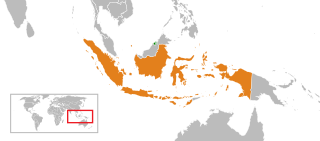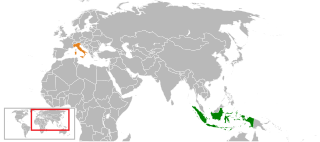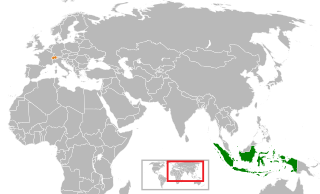
Since independence, Indonesian foreign relations have adhered to a "free and active" foreign policy, seeking to play a role in regional affairs commensurate with its size and location but avoiding involvement in conflicts among major powers. During the presidency of Sukarno, Indonesia's foreign relations were marked by engagement with other newly independent nations in Asia and Africa, as exemplified by the Bandung Conference, the subsequent foundation of the Non-Aligned Movement and a confrontational attitude towards Western powers, justified by a belief in the CONEFO and opposition to what Sukarno termed as NEKOLIM.

Hungary–Indonesia relations refer to bilateral relations between Hungary and Indonesia. The two countries established diplomatic relations in 1955. A Hungarian embassy was opened in Jakarta in 1957. In line to Hungarian "Eastern Opening" policy, and due to Indonesian political weight and market potentials, Hungary considered Indonesia as one of the most influential states in the ASEAN. While Indonesia sees Hungary as a potential market and a strategic entrance to penetrate the markets of Central Europe and Eastern Europe. Hungary has an embassy in Jakarta, while Indonesia has an embassy in Budapest.

Indonesia and Romania established diplomatic relations on 20 February 1950, two days following Romania's recognition of Indonesian sovereignty on 18 February 1950. Indonesia and Romania have agreed to enhance cooperation in the trade sector. The nations are expecting the other to be the gate to enter each regional market: Indonesia as the gate to enter the ASEAN market and Romania as the gate to enter the European Union's. Indonesia has an embassy in Bucharest and Romania has an embassy in Jakarta.

Colombia and Indonesia established diplomatic relations in 1980. Both are members of the Non-Aligned Movement, the Pacific Economic Cooperation Council, the Cairns Group, and the CIVETS block. Indonesia has an embassy in Bogotá, while Colombia has an embassy in Jakarta.

Diplomatic relations were established between Croatia and the Philippines on February 25, 1993, soon after the Philippines recognized Croatia as an independent nation in 1992. The two countries have links between their shipping industries, including port management, and seafarers.

Brunei Darussalam and Indonesia established diplomatic relations in 1984. Since then, both countries enjoy warm and friendly relations. Brunei has an embassy in Jakarta, while Indonesia has an embassy in Bandar Seri Begawan. Indonesia and Brunei don't share direct land borders. Since diplomatic relations were established back in 1984, relations between the two countries overall progressed well, and both sides continued to enjoy strong ties in a wide spectrum of co-operations; including trade and investment, tourism, agriculture, marine and fisheries, health, defence, transnational crimes, education, youth, culture and people-to-people contacts.

Indonesia and Suriname established diplomatic relations on 24 January 1976. Both had a special relationship, based upon shared common history as former colonies of the Dutch Empire. Large numbers of Javanese migrated to Suriname to work on plantations during the late 19th and early 20th-centuries. Indonesia has an embassy in Paramaribo also accredited to the Co-operative Republic of Guyana, while Suriname has an embassy in Jakarta. Indonesia and Suriname are members of the World Trade Organization (WTO) and Forum of East Asia-Latin America Cooperation.

Indonesia and Italy established diplomatic relations on 29 December 1949. Italy has shown strong desire to improve its relations with Indonesia, especially in intercultural understanding and trade. Indonesia recognizes Italy's strategic location and important role in the middle of Mediterranean region, while Italy has favoured relations with Indonesia, and sees Indonesia as the leader in Southeast Asia. The relations between two countries not only important to bridge the two regional communities; European Union and ASEAN, but also vital as intercultural and interfaith dialog, since Indonesia has the largest Muslim population in the world, and Italy is the heart of the Catholic faith.

Cuba and Indonesia established diplomatic relations in 1960. During the administration of Indonesia's first president Sukarno in the 1960s, Indonesia and Cuba enjoyed an exceptionally close relationship. The relations between the two nations mostly focused on sports and health. Cuba has an embassy in Jakarta, while Indonesia has an embassy in Havana that is also accredited to the Commonwealth of the Bahamas and Jamaica. Both nations are full members of the Non-Aligned Movement and partners in the Group of 77 and the Forum of East Asia-Latin America Cooperation.

Indonesia and Switzerland established diplomatic relations in 1952. In 2010, the heads of state of the two countries agreed to launch negotiations on a Comprehensive Economic Partnership Agreement (CEPA). Switzerland has named Indonesia as one of seven priority countries for economic development cooperation. Indonesia has an embassy in Bern, while Switzerland has an embassy in Jakarta, also accredited for East Timor and ASEAN.

Bosnia and Herzegovina–Indonesia relations refers to the bilateral relations between Bosnia and Herzegovina and Indonesia. Bosnia and Herzegovina has an embassy in Jakarta, while Indonesia has an embassy in Sarajevo. The bilateral relations was initially motivated by humanity and religious solidarity. As a nation with the largest Muslim population, Indonesians were shocked by the ethnic cleansing against Muslim Bosniaks during the Bosnian War, and promptly organized and mobilized help. Indonesian support for Bosnia and Herzegovina ranged from collecting donations, sending peacekeeping forces under United Nations, to building the Istiqlal Mosque in Sarajevo.

Jordan and Indonesia established diplomatic relations in 1950. Both are Muslim majority countries who, despite the challenges, wish to promote and projects the Islamic values of tolerance, justice and equality. Both nations often share similar stances upon issues in the Middle East, such as the Syrian Civil War and the Israeli–Palestinian conflict. Economy and trade relations are also particularly important, currently Indonesia is Jordan's largest trade partner in ASEAN. Jordan has an embassy in Jakarta, while Indonesia has an embassy in Amman that is also accredited to Palestine. Both countries are members of the Organisation of Islamic Cooperation and the Non-Aligned Movement.

Indonesia and Peru established diplomatic relations in 1975. Both nations see each other as an attractive market with good prospects and potentials, and seeks to boost trade relations. Indonesia has an embassy in Lima, while Peru has an embassy in Jakarta. Indonesia and Peru are members of multilateral organizations such as the Asia-Pacific Economic Cooperation, the World Trade Organization (WTO), Non-Aligned Movement and Forum of East Asia-Latin America Cooperation.

Ethiopia and Indonesia established diplomatic relations on 20 June 1961, followed by the opening of an Indonesian embassy in Addis Ababa in 1964, also accredited to Djibouti. Ethiopia established an embassy in Jakarta in the second half of 2016. Arega Hailu Teffera, Ambassador Extraordinary and Plenipotentiary of the Federal Democratic Republic of Ethiopia to Indonesia presented his credentials to President Joko Widodo on 23 February 2017. The Embassy of Ethiopia in Jakarta is accredited to ASEAN HQ, Malaysia, Singapore, Cambodia, the Maldives and Pakistan. Both nations are members of the Non-Aligned Movement and the Group of 77.

Indonesia–Uzbekistan relations was officially established on June 23, 1992. Both countries have recognized importance of each other's potential; Uzbekistan realized the strategic importance of Indonesia, home to the world's biggest Muslim population and Southeast Asia’s biggest economy, while Indonesia recognize Uzbekistan strategic importance as the gate to Central Asia, a growing economy also a potential market. Indonesia has an embassy in Tashkent, while Uzbekistan has an embassy in Jakarta. Both countries have Muslim-majority population and both are members of Organisation of Islamic Cooperation.

Indonesia–Kazakhstan relations refer to bilateral relations between Indonesia and Kazakhstan. The two countries officially established relations in 1993 and share some similarities; both countries possess abundance of natural resources, have predominantly Muslim populations with significant Christian minorities, ensure harmonious diversity and a commitment to human rights and democracy. Both nations have agreed to increase cooperation in several economic sectors, such as agriculture, industry, pharmaceuticals, petroleum, transportation infrastructure and machinery manufacture. Indonesia has an embassy in Astana, while Kazakhstan has an embassy in Jakarta. Both nations are members of the Asia Cooperation Dialogue, Organisation of Islamic Cooperation and the United Nations.

Indonesia and Serbia maintain diplomatic relations established between Indonesia and SFR Yugoslavia in 1954.

Indonesia–Oman relations was officially established on 5 December 1977. Indonesia and Oman are Muslim majority countries and shares same commitment in pursuing global peace and prosperity. Indonesia has an embassy in Muscat, while Oman has an embassy in Jakarta. Both countries are the member of Organization of Islamic Cooperation and also Non Aligned Movement.

Indonesia–Mongolia relations refer to foreign relations between Indonesia and Mongolia since 1956. Both countries are members of the Asia Cooperation Dialogue, Forum of East Asia-Latin America Cooperation, Non-Aligned Movement, World Trade Organization and the United Nations.





















